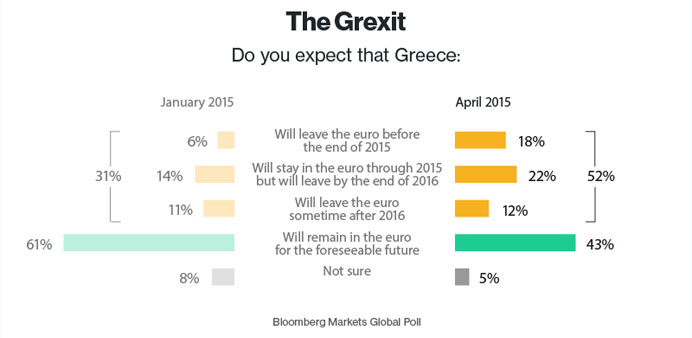Bloomberg Business /London
Greece, mired in a protracted financial crisis and at loggerheads with its bailout stewards, will leave the euro, according to the majority of investors, analysts, and traders in a Bloomberg survey.
Fifty-two percent of the respondents in the Bloomberg Markets Global Poll believe the cash-strapped country will leave the 19-nation bloc at some point, compared with 43% who see Greece remaining in the euro for the foreseeable future. In answer to the same question in mid-January, just 31% of poll respondents predicted a Greek exit and 61% had the country staying in.
The downbeat assessment of Greece’s prospects, more than five years after the country’s first bailout, comes as the country stands on the edge of a financial abyss. Prime Minister Alexis Tsipras has so far failed to squeeze a loan payment out of his country’s institutional creditors as he sticks to his pledge to dial back austerity, while the nation’s banks stay on European Central Bank life support.
“The banking sector is Greece’s Achilles heel, and if the ECB decides to stop funding, then the situation will be even more fragile than it is at the moment,” said Diego Iscaro, a senior economist at research company IHS Global Insight in London. “That could trigger an exit—eventually.”
Having lost access to capital markets and being ineligible for the ECB’s regular financing operations, Greece’s banks are reliant on the ECB-approved Bank of Greece Emergency Liquidity Assistance.
Eighteen percent of respondents in the April survey predict a departure this year, with a further 22% saying a Grexit would come before the end of 2016. An additional 12% said that while the country will battle through its most immediate difficulties, it will leave the euro area at some point after 2016.
While Greece remains a problem, it’s not affecting optimism about the euro-area economy as a whole. Gross domestic product in the euro area will increase 1.4% in 2015 and 1.7% in 2016, according to the median forecast of 59 economists surveyed by Bloomberg.
The contagion risk from a Greece exit has been limited, according to Gizem Kara, an economist at BNP Paribas in London. The dangers posed by a departure of the region’s most indebted country have been mitigated by the ECB’s outright monetary transactions and quantitative easing programs, as well as by the creation of the euro area’s rescue fund and central bank supervisor. At the same time, banks have been recapitalized, and governments have narrowed their deficits.
“In March we scaled up our growth forecasts quite significantly, and one of the major reasons for that is the ECB’s QE,” Kara said. “Lower interest rates will feed into investment growth, and better demand outlook in general will push corporates to invest more and employ more.”
The Bloomberg poll, conducted April 14-15, shows the proportion of respondents who believe the eurozone economy is improving has hit 39%, up from 14% in January. While 33% believe the situation is deteriorating, this is half the number who said they agreed with that statement when polled four months earlier. Twenty-six% believe the area’s economy to be stable, according to this month’s poll.
Asked to choose the one or two markets that offer investors the best opportunities over the next 12 months, Bloomberg subscribers made the eurozone their first choice, at 35%, beating out the US, which got 33%.
Still, there’s danger in believing Greece is the only large risk to the European economy, according to Ludovic Subran, chief economist at Paris-based trade-credit insurer Euler Hermes.
“Most people see Greece as a bad case of gangrene, but it’s wrong to only see that Europe’s problems will disappear if Greece is cut off,” he said. “The bigger picture is that turnover of companies is flat at best in most countries; even if profitability is higher, the top line is not growing as fast and the jobs recovery is not working.”
The poll of 1,280 Bloomberg subscribers was conducted by Selzer & Co, a Des Moines (Iowa) firm. The poll has a margin of error of plus or minus 2.7 percentage points.
The euro area’s quantitative easing programme began when the ECB began buying government bonds on March 9. President Mario Draghi overcame German-led opposition on the bank’s Governing Council and pledged an asset-purchase programme worth about €1.1tn ($1.2tn).
Forty-three percent of people who responded to the Bloomberg poll said they believed monetary policy is about right, with 38% saying it’s too accommodative and 15% saying it’s too restrictive.
As for Draghi himself, 68% said they feel favourable toward him vs. 25% unfavourable.
Sixty percent said they were optimistic about German Chancellor Angela Merkel’s policies that affect Germany’s investment climate. This represents a decline since a peak 12 months ago, when 76% were optimistic.
It’s Merkel who might hold the key to Greece’s fate, said Subran of Euler Hermes.
“A Greek default is more and more likely, but I don’t believe for a minute in a Greek exit, because no one wants that responsibility or that legacy,” he said.

